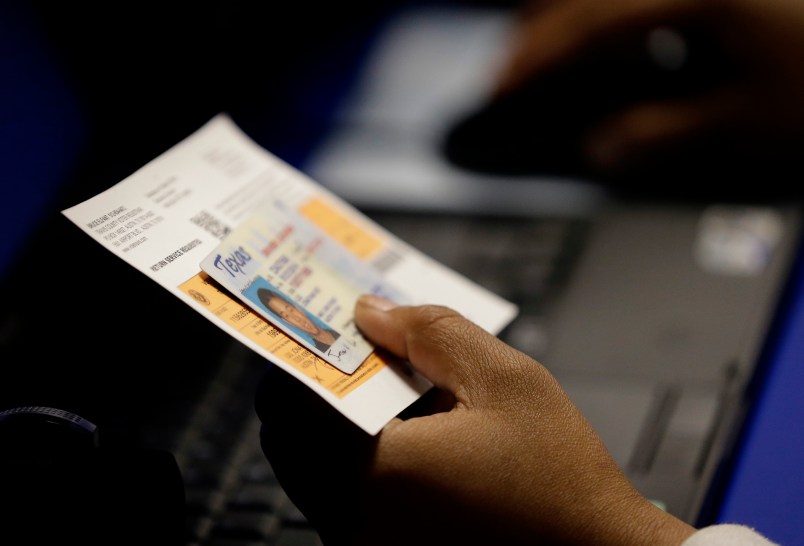The full Fifth Circuit U.S. Court of Appeals has decided to hear a challenge to Texas’ voter ID law, after a three-judge panel of the appeals court ruled that the law violated the Voting Rights Act.
The state of Texas had appealed the earlier decision to be reviewed “en banc”—meaning by the entire 15-judge court—in August, and the Fifth Circuit announced that it accepted it in an order released Wednesday.
The the law was challenged in 2013 by civil rights groups, who were later joined in the lawsuit by the U.S. Justice Department. So far the challengers had been successful in lower courts. But the full the 5th Circuit Court, with 10 of the judges appointed by Republican Presidents, is considered the most conservative appeals court in the country.
The three-judge appeals court panel ruled last August that the voter ID law, which is one of the strictest in the country, had a discriminatory effect in violation of Section 2 of the Voting Rights Act. That decision narrowed a district court’s 2014 ruling that said the law was also discriminatory in its intent, violated the 14th Amendment and amounted to an unconstitutional poll tax. But it was still considered a victory for the challengers.
The 2015 appeals court decision urged that the case go back down to a lower court where a remedy could be worked out before the 2016 election, although the voting rights activists who brought the case expected Texas to challenge it up the judicial ladder.
Before Justice Antonin Scalia’s unexpected death last month, it was assumed that the Texas case would eventually make it to the Supreme Court. In 2013, a five-justice conservative majority, including Scalia, gutted a portion of the Voting Rights Act that required certain states to seek federal approval for new voting regulations. That opened the door for Texas to implement its 2011 voter ID law, which had been previously blocked by the U.S. Justice Department and a district judge under the full VRA.
The law was allowed to go into effect for the 2014 election in an appeals court motion the Supreme Court refused to overturn. How the legal battle unfolds will determine whether it is implemented in the 2016 election.







If at first you don’t succeed…
Texas must have been rather shattered by the previous decisions: the Fifth Circuit is far and away the most conservative of them all. If they turn you down on a matter like this, you’ve got a piss-poor case.
Edited: to remove erroneous reference to two hearings; apparently the (and, so far, only) first hearing was held by a 3-judge panel.
Does the court have to accept an appeal for an en banc rehearing? If not, that probably means the full court will gut. Just because they can.
Suggestive indeed. “Damn! We picked the wrong three first time! Now let’s jest us all get together an’ fix that.”
Tierney… Thanks for the continuing coverage of probably the most corrupt, bigoted, single-focused rigged court in the American system. I, unfortunately, speak from experience dealing with texas and it’s idiot-based social systems (including it’s ‘stuffed’ court system), and still have family there that seems exposed to this constant form of repression and outward racial/religious hate hourly.
I hope you don’t have to expose yourself or any of your family to this environment because given today’s trends, beliefs and incendiary rhetoric coming out of every oriface of texas, it will implode. Hopefully soon.
Correction: there is no “probably” about it (at least as to federal circuits).